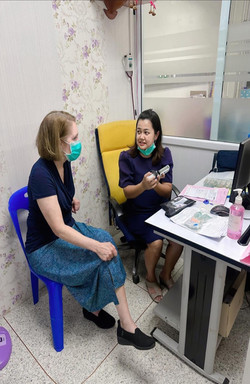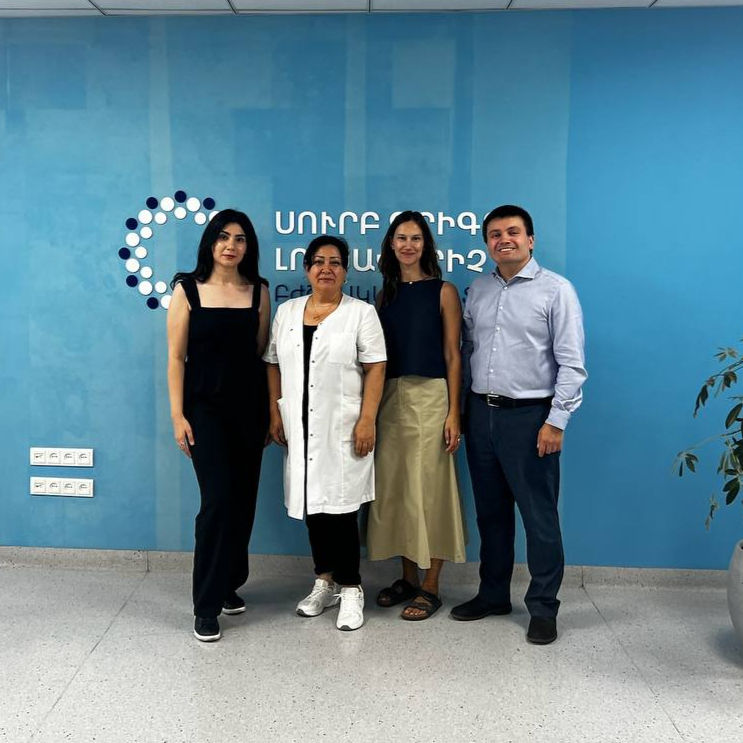Lessons Across Borders: Reflections on Medicine in Thailand
- Nuvance Health Global Health Program

- Oct 30, 2025
- 4 min read

Written by Julia Auerbach, MD Physician in Primary Care & Pediatrics, Brookfield, Nuvance Health
In 1991, Thailand changed my life. I arrived on a sunny New Year’s Day with my father for three weeks of camping and trekking in this beautiful country. I was about to enter my last semester of law school with every intention of soon becoming a lawyer. So often, traveling away from our daily lives can be transformative, and this trip was no exception. One day in a village near the border of Laos, we came across a woman lying down and coughing. The guide told us that she likely had tuberculosis. Everything suddenly became clear to me. I turned to my dad and said, “I should have been a doctor.” He replied, “Do what you have to do.”
We continued to enjoy the trip. The Thai people are some of the kindest and most gracious in the world, and their food was wonderful. Returning home, my mother was just as supportive as my father, but I continued to struggle with my decision. I had completed none of my premedical requirements in college. In nine months I would be a practicing lawyer, or in nine years I could graduate from residency. The deciding factor was the one that still drives me today—the collaborative nature of medicine and the joy of helping people. By its nature, law is often an adversarial process. I polled all of my friends in the two professions. Few in the legal field had a passion for law. In contrast, my medical friends were all working 100-plus-hour weeks, yet they universally raved about the excitement of learning, discovery, and working on their teams.
I completed law school and passed the Connecticut Bar. That September (with the support of my excellent parents), I entered a two-year Post Baccalaureate program. I had a purpose and a passion, and I never looked back.
Fast forward 33 years, and I had married a charming pediatrician, raised two wonderful boys, and built a large patient panel as a Family Physician in Brookfield. It has been a privilege and joy to help my patients navigate their health care through the years. In turn, I have learned a lot from them about how to live my own life and cope with its invariable ups and downs.
It is easy to become bogged down in the day-to-day frustrations, and EMR has fundamentally changed medicine by intruding into our personal time. I was therefore excited to learn about the Nuvance Health Global Health Program. Attending the annual conference last September, I was amazed at how many robust, successful sites there are, and once again, how enthusiastic everyone was about their shared goal of helping patients.
Late last October, I came full circle and arrived again in Bangkok, this time with two AUC medical students, Michelle Pollack and Johnny Iturralde. It was refreshing to see their excitement; they both had an enthusiasm for learning and instant comfort in their surroundings. As before, our hosts could not have been kinder, and never stopped feeding us. I was treated like a VIP, visiting multiple hospitals and clinics, including traditional Thai medicine facilities, and did a few home visits. All of my hosts gave time out of their busy days to show me around and spend time exchanging insights with me about Family Medicine. I thoroughly enjoyed the experience. Thailand is known for its excellent health care system. With universal coverage and a structured delivery system, they do a much better job caring for their lowest-income citizens, and do well caring for their population as a whole, with fewer resources than we have. As an HIC, we likely do better caring for our more complex patients with more resources, but we fail at caring for the uninsured, underinsured, and Medicaid populations. Their hospital wards are more crowded and have less access to technology. Ours are more spacious, but we struggle with staffing, too much technology, and meeting the needs of patients spread out through the floors.
No matter where they live in the world, health care personnel have the shared goal of helping patients. Many of the Thai physicians explained to me that with easy access to health care, their patients have “low self-care”—they would rather come to the doctor than take responsibility for their lifestyle choices. It is true that we have many patients who are proactive and take their health seriously. But my Thai colleagues were surprised to hear that despite being an HIC, we also have a problem of low self-care in a large number of our patients.
Unhealthy choices, sedentary lifestyles, too many hours sitting at a desk working from home. They see us for a brief visit, and we are supposed to “fix” all of the problems. Our patients are on two to three times more medications than the patients in Thailand—does that make them healthier or less healthy?
What struck me the most, and what I enjoyed, are the similarities. We were in Thailand at the time of the U.S. elections, a time of great division, disinformation, and distrust in our country. It was reassuring to be somewhere with people focused on science and caring for others. On my last day, I attended a private clinic with one of the Family Medicine faculty. A man in his 60s came in complaining about fatigue, achiness, trouble sleeping, and malaise. He had diabetes and had lost weight on semaglutide until somehow he lost coverage and had gained it back.
He was sure that he had dengue or malaria and wanted lab testing. Being a private clinic day, the doctor had time to speak with him. They discussed how the patient was making poor food choices, needed to cut back on alcohol, and get more exercise. By the end, he felt better and agreed that he did not need any lab work. He said, “This is why he is the greatest doctor!” The physician tried to explain to me what happened. I laughed and explained that when our patients have those symptoms, they often are worried they have Lyme disease. This patient’s concerns were universal, and the key to the success of this encounter was the relationship and respect between these two individuals. It was a nice way to wrap up a great experience.
I am grateful to the medical students who made the trip so enjoyable and the innumerable physicians who took such great care of me in Thailand, particularly our supervisors Dr. Prym Mordmuang and Dr. Lunla Udomwech. I look forward to my next adventure with the Global Health Program.

















